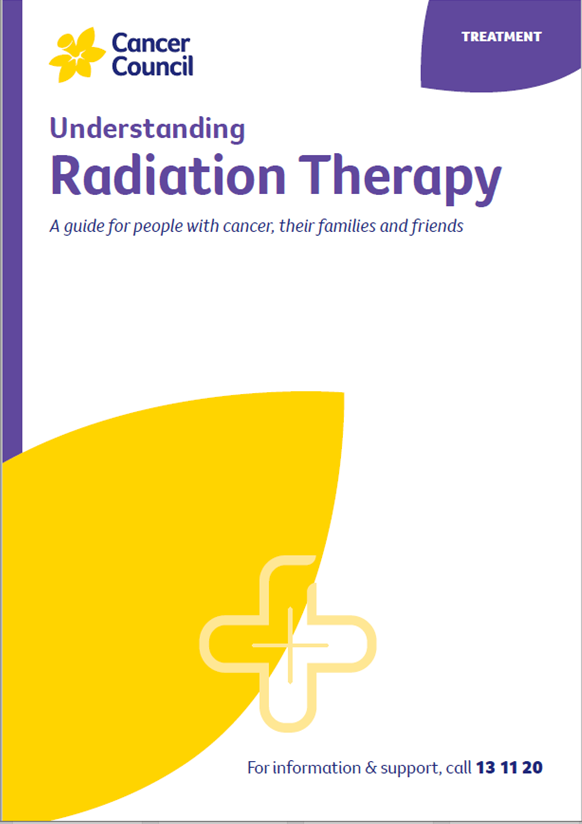- Home
- Hodgkin lymphoma
- Treatment
- Radiation therapy
Radiation therapy for Hodgkin lymphoma
Radiation therapy (also known as radiotherapy) uses radiation to kill or damage cancer cells so they cannot grow, multiply or spread. You may have radiation therapy after chemotherapy. The type of radiation therapy used to treat Hodgkin lymphoma is called external beam radiation therapy (EBRT). It is delivered using a machine called a linear accelerator, which produces high-energy x-rays that target cancer cells.
Learn more about:
- Planning radiation therapy
- Having radiation therapy
- Side effects of radiation therapy
- Late effects of treatment
- Video: What is radiation therapy?
Planning radiation therapy
About 3 weeks before you start your treatment, your radiation oncologist will use the results of your imaging scans to help work out the lymph node areas to target with radiation. You will have a planning session with your radiation oncologist, and have another CT scan. This session will take 1–2 hours and will help your treatment team to precisely target the cancer while avoiding healthy cells.
Having radiation therapy
Radiation therapy usually starts about a month after your last chemotherapy cycle. You will be in the treatment room for about 15–45 minutes. The radiation therapist will make sure you are in exactly the same position during each treatment. The actual treatment takes only 1–2 minutes, and you will not be able to see or feel the radiation. Treatments are delivered daily from Monday to Friday over 2–4 weeks.
Side effects of radiation therapy
Radiation doses used today are lower and more targeted than in the past, so there are fewer side effects. The most common side effect of radiation therapy is tiredness. Talk to your treatment team about suitable exercise during radiation therapy – improving fitness can help reduce tiredness. Other side effects will depend on the part of the body being treated, for example, radiation therapy to the abdomen may cause an upset stomach and diarrhoea. Treatment can also lead to skin changes such as red, dry and itchy skin at the treatment area.
Side effects can build up towards the end of the course of treatment, but most will be temporary. You will have regular reviews with the radiation oncologist or other team members to monitor your progress and support you. Talk to your treatment team about any side effects that concern you.
For more on this, see our general section on Radiation therapy.
Late effects of treatments
Some side effects from chemotherapy or radiation therapy may not show up until months or years after treatment. These are called late effects.
With improved staging and treatment of Hodgkin lymphoma, late effects are less likely than in the past. Before treatment starts, your doctor will talk to you about any possible late effects.
If any symptoms do appear, even many years after treatment, ask your GP whether they could be related to the treatment you had for Hodgkin lymphoma.
When treatment finishes, ask your doctors for details of the chemotherapy and radiation therapy you had so you have this on hand if any late effects do occur.
| Heart problems | Chemotherapy can increase the risk of heart disease, and radiation therapy to the chest area can lead to heart disease. |
| Lung problems | Some types of chemotherapy can increase the risk of long-term lung problems. Talk to your doctor if you notice lung symptoms, such as shortness of breath. |
| Second cancer | In some cases, there may be an increased risk of developing another cancer near the area where radiation therapy was given. People treated with some chemotherapy drugs may also have a higher risk of developing a second cancer later in life. |
| Early menopause and infertility | Some chemotherapy drugs can damage your ovaries or testicles. This might lead to early menopause in women, and reduced fertility in both men and women. |
| Osteoporosis | Reaching menopause early may increase the risk of osteoporosis. This is when bones become weaker and thinner and can lead to bone pain and fractures. |
→ READ MORE: Stem cell transplants for Hodgkin lymphoma
Video: What is radiation therapy?
Watch this short video to learn more about radiation therapy.
Podcast: Making Treatment Decisions
Listen to more episodes from our podcast for people affected by cancer
More resources
Prof Mark Hertzberg AM, Head, Department of Haematology, Prince of Wales Hospital; Dr Puja Bhattacharyya, Haematology Staff Specialist, Western Sydney Local Health District – Blacktown Hospital; A/Prof Susan Carroll, Senior Staff Specialist, Radiation Oncology, Royal North Shore Hospital and University of Sydney; Gerry Flanagan, Consumer; Alisha Ganesh, Haematology Clinical Nurse Consultant, Concord Repatriation General Hospital; Kelly King, Cancer Council Liaison, Central Coast Cancer Centre; Ilana Krug, Social Worker – Haematology and Oncology, Gosford Hospital; Amy McGee, Consumer.
View the Cancer Council NSW editorial policy.
View all publications or call 13 11 20 for free printed copies.

